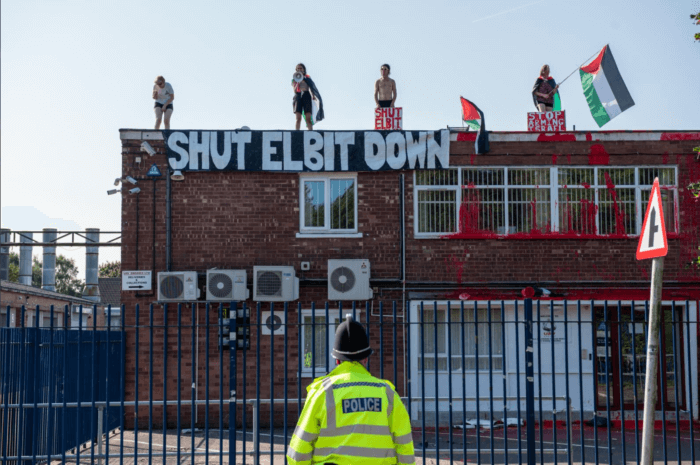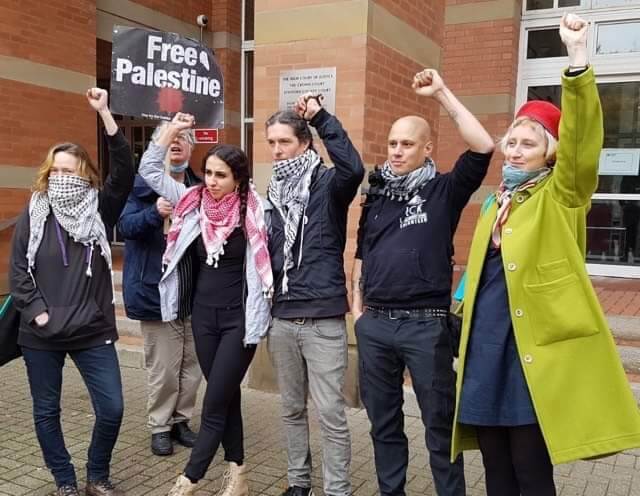Launching a direct action network seeking to end Britain’s century-long complicity in the colonization of Palestine was never going to be easy. There were hardships along the way – though facing 38 years imprisonment (for several charges, including blackmail) wasn’t quite in our plans. Nevertheless, launching Palestine Action was something long overdue – breaking from the world of petitions, letters, and rallies, we opted instead for hard-hitting, concrete action, targeting Elbit Systems, Israel’s largest arms company. The repression we are now facing is a testament to the success of the campaign to #ShutElbitDown. So how did we get here?
Palestine Action started in July 2020, a little over two years ago. Our inaugural action – where we stormed Elbit’s London headquarters, was done with little more than scrap pots of paint, a live streaming phone, and our own bodies. In between tagging walls and getting manhandled by security, we chanted: “Your profits are covered in Palestinian blood”. Scrawled on the office walls was a promise from us: “We will be back.”, and sure enough, we were back a week later, undeterred by the violence of security guards.

These two actions were enough to spark a response from Israel’s Defense Minister, Benny Gantz, and Minister of Strategic Affairs, Orit Farkash, who met with Dominic Raab (then UK Foreign Secretary), requesting that the British state crush our burgeoning resistance to Israel’s arms trade. Palestinian-Iraqi and co-founder of Palestine Action, Huda Ammori was elated at the news. Huda started out running university-level BDS campaigns, before turning to direct action. For her, the response of the apartheid state proved that “Even our initial few actions made this impact that years of campaigning simply failed to bring about.”
After this meeting, it seemed that the British state and its agents were on our case. A public protest outside Elbit’s (now permanently closed) London headquarters elicited a rapid police response that soon turned violent, with activists thrown to the ground and invasive searches. Amid the chaos, Huda reached for a bucket of red paint, hurling it on the doors of 77 Kingsway – symbolic of the Palestinian blood spilled by Elbit. This was, of course, met with a crowd of police who threw her to the ground – but not before she gave the usual chant: “Shut Elbit down!”
After this incident, it became clear the word was spreading; we sat in our cells when we were met with crowds of people chanting “Free Palestine” outside the station, in response to our barely one-month-old movement. The isolated acts of direct action we took had been seen by others and began to spur more into joining and rejecting the collective complicity Britain holds, tearing it down and building something else in its place: solidarity. It was time to build a mass movement dedicated to forcing Israel’s arms trade out of Britain through direct action.
The isolated acts of direct action we took were seen by others and began to spur more into rejecting the collective complicity Britain holds, tearing it down and building something else in its place: solidarity.
From then on we moved to the next steps of the campaign – in our case, it was the steps of a ladder, as we scaled and occupied the roof of an Elbit drone factory in Shenstone. We set up camp: dousing the site in red paint, smashing factory windows and facilities, and in effect decommissioning the factory. It was unknown to us what would follow, or how the state would respond – but, standing above the droves of police watching on, all that mattered was that we had halted the march of the Israeli arms industry and its continued profiteering off the massacre of Palestinians.
In the end, we held the factory for three days and were held for over 40 hours. A magistrates judge, looking to international law, saw that we were released. Our victory brought the movement to the forefront – we found more and more people across Britain were taking notice, wanting to take action themselves. It became clear that each moment Elbit’s sites continued to operate, meant the continuation of a 74-year-long occupation. One that has its roots in British colonialism, and is accompanied by the long and bitter collective trauma of Palestine. Our siblings across the world needed urgency and militancy on our part.

As the movement became more viable, we of course faced greater repression – as well as increased state surveillance, we were stopped at the border by counter-terrorism police, split into different interrogation rooms, and bombarded with questions about Palestine Action. Devoid of the right to “no comment”, we faced several hours of harassment and interrogation, about not only the movement but everything from religion, to families, to personal beliefs. Afterward, our laptops were seized and given to the Metropolitan Police, to aid in the serious charges they have thrown at us.
A police operation was brewing – the repression heightened again when plans were made to go on hunger strike outside JLL, the landlords of Elbit’s (now closed) London headquarters. Police surrounded where we lived (including plain-clothed officers), raiding an address shared with a large number of asylum seekers. Richard Barnard – Palestine Action co-founder, had belongings taken and arrested for “blackmail” as they put in their own words. Our passports were illegally seized and a day later, dozens of police officers came back and stormed the place once more.
It was months later that Richard was officially charged with blackmail, and Huda and fellow activist Milly were to follow suit. Charges of blackmail seem impossible when our tactics are the same as those used by countless other movements and organizations throughout history. We hold firm that our ‘special treatment’ from the state was because we had taken genuine, concrete action – for Palestine. A maximum sentence of 14 years imprisonment certainly doesn’t reflect what we were demanding: that the real estate company cut ties with a company that even HSBC refuses to invest in. It was and still is this: a politically charged prosecution.
Now, Palestine Action – the movement that has pushed hundreds to face arrest for Palestine, and shut down two Elbit sites in less than two years, is facing another wave of repression. The team that started it all (ourselves the co-founders and six other activists) are facing trial on October 10th. It will be held at Snaresbrook Crown Court and is set to last five weeks. Our charges include blackmail, criminal damage, and burglary. More details of our case and the campaign surrounding it can be found on our website.
Where states and businesses have thrown obstacles in our way, we overcame them, and came back stronger, a step closer to our goal: permanent closure of all Elbit sites in Britain. Indeed, 18 months after the launch of Palestine Action, Elbit’s factory in Oldham was forced to close for good. The company abandoned its headquarters in central London just a few months after that.
Every instance of state repression we’ve faced to date has been for one simple reason: Palestine Action has disrupted the smooth functioning of a business built on bloodshed.
Attempts at repression have only drawn more to our cause – and we now pose a genuine threat to the operations of Israel’s largest arms company. Every instance of state repression we’ve faced to date has been for one simple reason: Palestine Action has disrupted the smooth functioning of a business built on bloodshed. Drones raining fire on the ground below, or bullets cutting through bodies indiscriminately, it’s all money in the bank for the international arms industry.
In a world where such violence is woven into the fabric of life, and the tapestry of morality and legality is weaved by our oppressors, we had to take power back into the hands of normal people, enact people’s justice and enforce a people-backed arms embargo. We knew the change that was needed was never going to come from above – and certainly not from the British state. Their latest attempt to suppress the movement allows us to face down Israel’s arms dealers and their lackeys in the Crown Court. We stand as the accusers, not the accused, and with the knowledge that no matter the result, history will vindicate our actions. #ElbitIsGuilty, we are not!
Palestine Action is a direct-action network of groups and individuals formed with the mandate of taking direct action against Elbit Systems’ British locations at the grassroots level, calling for them all to be shut down and for the British government to end its complicity in Israeli apartheid.
You can follow the case of the #ElbitEight through Palestine Action’s Instagram, Twitter, and newsletter. More details, including demands of the #ElbitIsGuilty campaign, can be found here: palestineaction.org/elbitisguilty.



Well done! I hope you have good lawyers (like the Good Law Project) on your side.